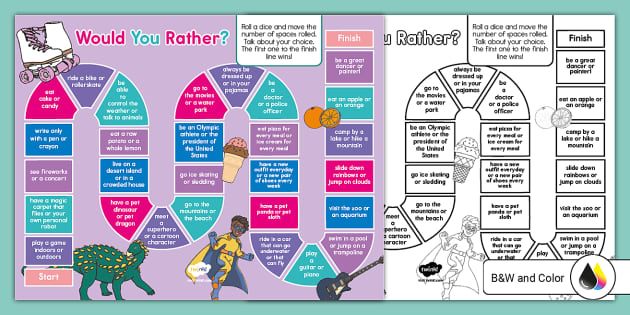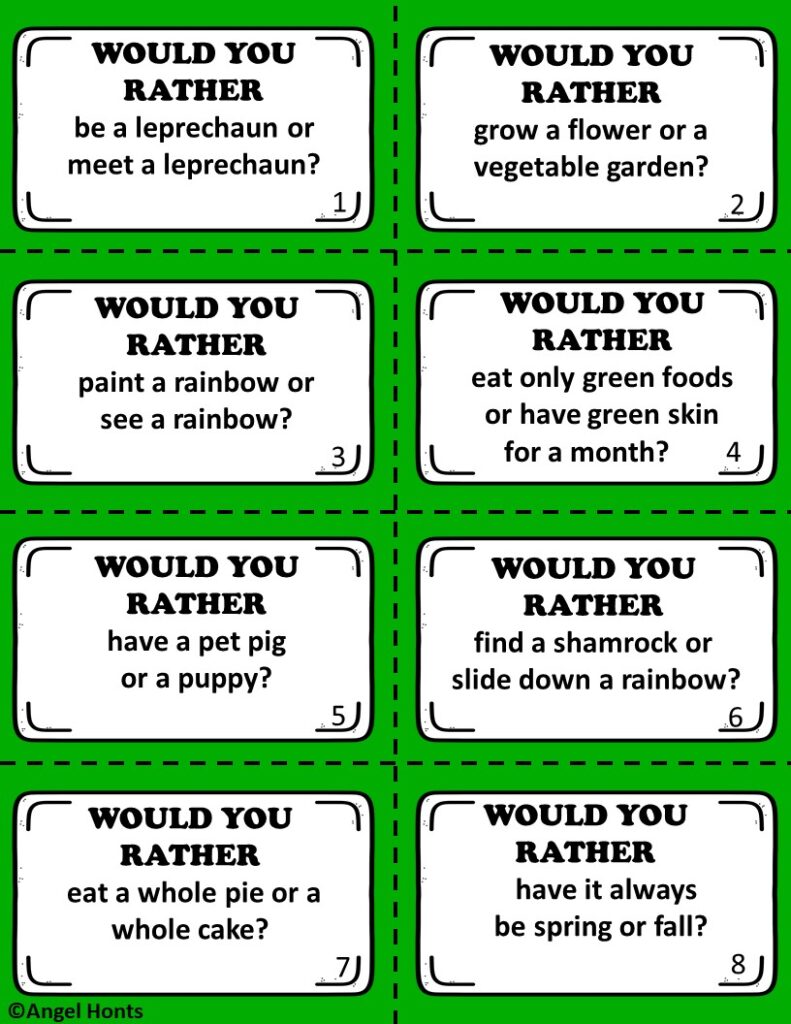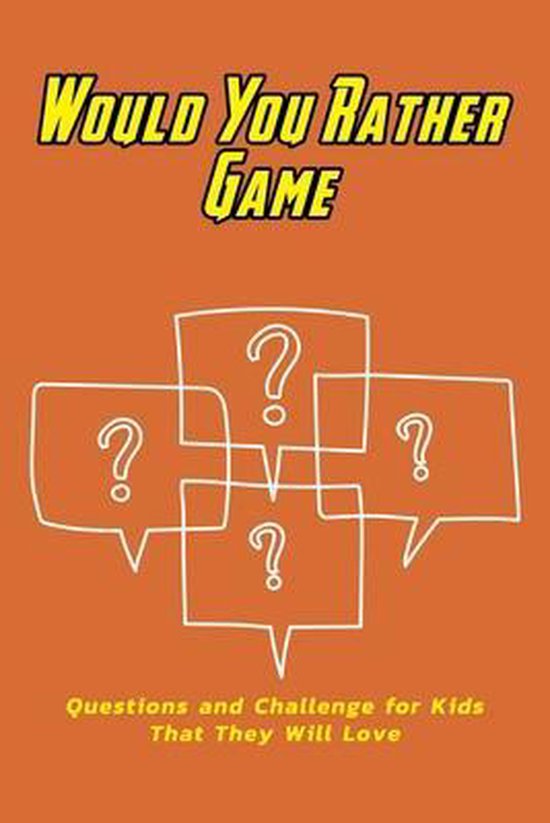The Engaging Power Of "Would You Rather" Games: A Comprehensive Exploration
The Engaging Power of "Would You Rather" Games: A Comprehensive Exploration
Related Articles: The Engaging Power of "Would You Rather" Games: A Comprehensive Exploration
Introduction
In this auspicious occasion, we are delighted to delve into the intriguing topic related to The Engaging Power of "Would You Rather" Games: A Comprehensive Exploration. Let’s weave interesting information and offer fresh perspectives to the readers.
Table of Content
- 1 Related Articles: The Engaging Power of "Would You Rather" Games: A Comprehensive Exploration
- 2 Introduction
- 3 The Engaging Power of "Would You Rather" Games: A Comprehensive Exploration
- 3.1 The Anatomy of "Would You Rather" Games
- 3.2 The Benefits of "Would You Rather" Games
- 3.3 The Cultural Significance of "Would You Rather" Games
- 3.4 Variations and Adaptations of "Would You Rather" Games
- 3.5 Frequently Asked Questions about "Would You Rather" Games
- 3.6 Tips for Playing "Would You Rather" Games
- 3.7 Conclusion
- 4 Closure
The Engaging Power of "Would You Rather" Games: A Comprehensive Exploration

"Would you rather" games, a simple yet captivating form of entertainment, have captivated audiences across generations. These games, characterized by their hypothetical scenarios and the challenge of making difficult choices, have become a staple of social gatherings, online platforms, and even educational settings. This exploration delves into the essence of "would you rather" games, examining their structure, benefits, and cultural significance.
The Anatomy of "Would You Rather" Games
At their core, "would you rather" games present two (or sometimes more) distinct options, each with its own set of advantages and disadvantages. The participant is tasked with choosing the option they find most appealing, often with no "right" or "wrong" answer. This simple premise creates a space for engaging discussion, exploration of personal values, and a glimpse into the decision-making processes of others.
The Benefits of "Would You Rather" Games
The seemingly innocuous nature of "would you rather" games belies their potential benefits:
- Stimulate Critical Thinking: The act of weighing the pros and cons of each option encourages critical thinking and analytical skills. Players are forced to consider the implications of their choices, fostering a deeper understanding of their own values and priorities.
- Enhance Communication and Social Interaction: "Would you rather" games provide a platform for engaging conversations, fostering a sense of connection and shared experience. The act of explaining one’s reasoning behind a choice opens doors for understanding different perspectives and fosters empathy.
- Promote Creativity and Imagination: The hypothetical nature of "would you rather" scenarios allows participants to tap into their imagination and explore possibilities beyond their immediate reality. This can spark creativity and inspire new ideas.
- Reduce Stress and Provide Entertainment: The lighthearted and humorous nature of many "would you rather" questions can provide a welcome distraction from daily stresses and anxieties. They offer a fun and engaging way to pass the time, encouraging laughter and shared moments of enjoyment.
The Cultural Significance of "Would You Rather" Games
"Would you rather" games have transcended the realm of mere entertainment, becoming ingrained in popular culture. Their presence in various forms of media, from social media platforms to television shows, demonstrates their enduring appeal. The games have also found a place in educational settings, serving as a tool for fostering critical thinking and communication skills among students.
Variations and Adaptations of "Would You Rather" Games
The basic format of "would you rather" games lends itself to endless variations and adaptations. Here are some notable examples:
- Personalized "Would You Rather": These variations focus on specific individuals or topics, creating a more intimate and engaging experience. For example, "Would you rather go on a date with [celebrity A] or [celebrity B]?"
- Themed "Would You Rather": These games center around specific themes, such as travel, food, or movies, allowing for more focused discussions and exploration of shared interests.
- "Would You Rather" Challenges: These versions introduce an element of competition, encouraging participants to come up with the most creative or challenging "would you rather" scenarios.
Frequently Asked Questions about "Would You Rather" Games
1. What makes a good "would you rather" question?
A good "would you rather" question should be engaging, thought-provoking, and ideally have no clear "right" or "wrong" answer. It should encourage meaningful discussion and offer a glimpse into the participants’ values and perspectives.
2. How can I create my own "would you rather" game?
To create your own "would you rather" game, start by brainstorming a list of topics or themes that interest you. Then, come up with two (or more) options for each topic, ensuring that the options are distinct and offer a genuine choice. Consider making the options humorous, challenging, or thought-provoking to keep the game engaging.
3. Can "would you rather" games be used for educational purposes?
Absolutely! "Would You Rather" games can be a valuable tool in educational settings. They can be used to stimulate critical thinking, encourage discussion, and promote creative problem-solving. Teachers can adapt the games to specific subjects, incorporating real-world scenarios and relevant information.
4. Are there any risks associated with "would you rather" games?
While "would you rather" games are generally harmless, there are some potential risks to consider:
- Offensive or insensitive questions: It’s important to ensure that the questions are appropriate and respectful, avoiding topics that could be offensive or insensitive to certain individuals or groups.
- Triggering sensitive topics: Some "would you rather" questions may touch upon sensitive topics that could be triggering for certain individuals. It’s important to be mindful of the potential impact of the questions and to provide a safe space for participants to express their feelings.
Tips for Playing "Would You Rather" Games
- Set the right tone: Create a relaxed and welcoming environment where participants feel comfortable expressing their opinions and engaging in open discussion.
- Be respectful: Avoid judgment or criticism of others’ choices. Remember that there is no "right" or "wrong" answer in "would you rather" games.
- Encourage participation: Make sure everyone has an opportunity to share their thoughts and contribute to the conversation.
- Keep it lighthearted: While "would you rather" games can be thought-provoking, it’s important to keep the atmosphere lighthearted and fun.
Conclusion
"Would you rather" games, with their simple premise and endless possibilities, offer a unique and engaging form of entertainment. They stimulate critical thinking, foster communication, and promote creativity, making them an ideal tool for social gatherings, educational settings, and simply passing the time. By understanding the benefits and variations of these games, we can appreciate their cultural significance and harness their potential to enhance our lives.








Closure
Thus, we hope this article has provided valuable insights into The Engaging Power of "Would You Rather" Games: A Comprehensive Exploration. We appreciate your attention to our article. See you in our next article!